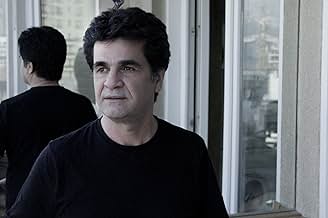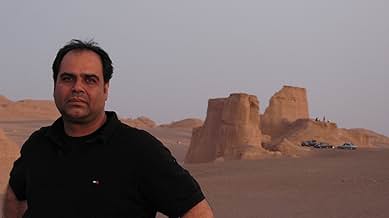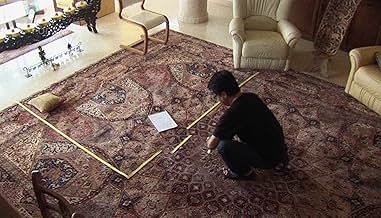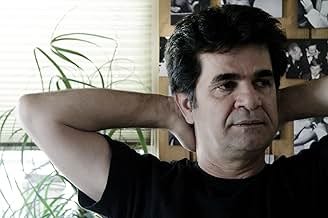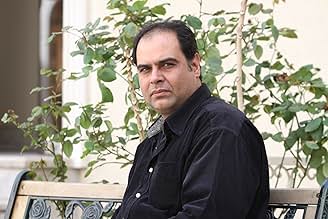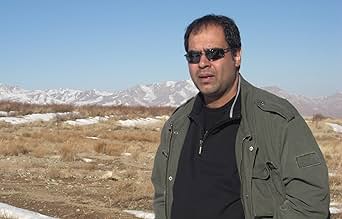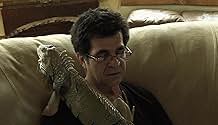IMDb RATING
7.4/10
5.9K
YOUR RATING
It's been months since Jafar Panahi, stuck in jail, has been awaiting a verdict by the appeals court. By depicting a day in his life, Panahi and Mojtaba Mirtahmasb try to portray the depriva... Read allIt's been months since Jafar Panahi, stuck in jail, has been awaiting a verdict by the appeals court. By depicting a day in his life, Panahi and Mojtaba Mirtahmasb try to portray the deprivations looming in contemporary Iranian cinema.It's been months since Jafar Panahi, stuck in jail, has been awaiting a verdict by the appeals court. By depicting a day in his life, Panahi and Mojtaba Mirtahmasb try to portray the deprivations looming in contemporary Iranian cinema.
- Awards
- 10 wins & 14 nominations total
- Directors
- Writer
- All cast & crew
- Production, box office & more at IMDbPro
Featured reviews
Iranian director Jafar Panahi is one of world's most important movie makers nowadays, while also a victim of the oppressive regime in his country. Arrested, together with other artists, during the events following the Iranian presidential elections in 2009, he spent several months in prison. He was freed then on bail while the judicial procedure against him was going on. Mr. Panahi was eventually sentenced to 6 years of prison and 20 years ban to make movies.
It was during the period spent at home in 2010 that Jafar Panahi made this movie, with the title This is Not a Film (In Film Nist). A friend, documentary producer Mojtaba Mirtahmasb (the author of Lady of the Roses, 2008), came with a consumer-grade camera and shot the footage for a 75 minutes video, having Mr. Panahi as co-director, screenwriter, film editor and star. The video was eventually smuggled outside Iran on a flash drive and screened at the 2011 Cannes Festival.
It's just that: 75 minutes in a day spent by Jafar Panahi at home, waiting for the result of the trial. He talks to the phone with his lawyer, then feeds his pet (who is a very nice iguana), then talks with the cameraman shooting the footage about a project for a new film, rejected by the censorship, memories from some of his movies come and go, suddenly a terrible noise of explosions is heard - it's nothing than fireworks, and Mr. Panahi goes to the window to shoot them with his cell phone.
A movie that is not a movie, says Mr. Panahi. It's just mundane reality. Well, it's not that simple: this movie is a non-movie while this non-movie is a movie. Because it's his reality, his universe, which is sending us to the universe of his movies. All his movies talk actually about him, about his universe, and it becomes obvious here, in this non-movie which carries all the tension between image and reality - reality sublimated in cinematic image. Like Mozart, this moviemaker thinks only in artistic constructions. For Mozart any fact of life was musical sound, musical rhythm, for Panahi every fact of life is cinematic image, cinematic rhythm. Look, even his concerns for the sentence to come become art! However, the strongest association should be made to Beethoven! This moviemaker carries all the tension between reality and art, all his creation is fully aware of the paradoxical relationship between reality and art: reality mirrored in art, art mirrored in reality, art suffering that reality struggles to keep its autonomy, reality suffering that it is taken for art.
It was during the period spent at home in 2010 that Jafar Panahi made this movie, with the title This is Not a Film (In Film Nist). A friend, documentary producer Mojtaba Mirtahmasb (the author of Lady of the Roses, 2008), came with a consumer-grade camera and shot the footage for a 75 minutes video, having Mr. Panahi as co-director, screenwriter, film editor and star. The video was eventually smuggled outside Iran on a flash drive and screened at the 2011 Cannes Festival.
It's just that: 75 minutes in a day spent by Jafar Panahi at home, waiting for the result of the trial. He talks to the phone with his lawyer, then feeds his pet (who is a very nice iguana), then talks with the cameraman shooting the footage about a project for a new film, rejected by the censorship, memories from some of his movies come and go, suddenly a terrible noise of explosions is heard - it's nothing than fireworks, and Mr. Panahi goes to the window to shoot them with his cell phone.
A movie that is not a movie, says Mr. Panahi. It's just mundane reality. Well, it's not that simple: this movie is a non-movie while this non-movie is a movie. Because it's his reality, his universe, which is sending us to the universe of his movies. All his movies talk actually about him, about his universe, and it becomes obvious here, in this non-movie which carries all the tension between image and reality - reality sublimated in cinematic image. Like Mozart, this moviemaker thinks only in artistic constructions. For Mozart any fact of life was musical sound, musical rhythm, for Panahi every fact of life is cinematic image, cinematic rhythm. Look, even his concerns for the sentence to come become art! However, the strongest association should be made to Beethoven! This moviemaker carries all the tension between reality and art, all his creation is fully aware of the paradoxical relationship between reality and art: reality mirrored in art, art mirrored in reality, art suffering that reality struggles to keep its autonomy, reality suffering that it is taken for art.
I saw this film (or not film, if you want..) at the CPH DOX festival yesterday and was spellbound by it. All reviews I have read, have focused on the political circumstances, and the fact that director Jafar Panahi has been blacklisted and sentenced by the Iranian government. I think many of these reviews focus too little on the beauty, warmth and wonderfully subtle message of this film, or the fresh and uplifting honesty and awareness of its cinematic language. To me the most important and moving aspects of this film, is found in the beauty of its atmosphere. In Panahis search for truth and honesty. In its daring and courageous will to let circumstances and coincidence be the writer and director. In its warm, original and surprisingly humorous form. The way the film evolves trough coincidence and the power of circumstance, it itself becomes a beautiful image of Mr. Panahis situation, and by doing that, it becomes a reflection on any persons situation, a reflection on existence itself. Dealing with society, suppression, creativity, filmmaking, human interaction, kindness and honesty I would find it difficult to explain what the film is actually about. Most of all its much more a poetic journey, than a political statement. If it is a statement its a statement of the humane. I understand why some will be bored watching this small, slow, quiet film. Any viewer will have to put himself in a state of slow enjoyment to really benefit from it. But it is absolutely worth it. To me one of the great achievements Mirtahmasb and Panahi makes here, is the fact that they made me feel, think and reflect more by watching two guys filming each other, than any million budget Hollywood movie has ever done. The self aware style of this film worked like a wake up call for me, making it so much stronger.
If you can relate to topics like: filmmaking, art, inspiration or problems connected to being a living being in the world, I highly recommend this. My best wishes for Mr. Panahi, and congratulations with the achievement.
If you can relate to topics like: filmmaking, art, inspiration or problems connected to being a living being in the world, I highly recommend this. My best wishes for Mr. Panahi, and congratulations with the achievement.
Hidden inside a birthday cake and smuggled out of the country, the 75-minute "effort", This is Not a Film, tells us all we need to know about the cruelty of the Iranian dictatorship and the courage of film director Jafar Panahi. Panahi, who has given the world such masterpieces as The White Balloon, The Circle, and Crimson Gold was arrested in March, 2010 and faces a ban of twenty years from making films and a six-year prison sentence for "propaganda against the Islamic Republic." This refers to exercising free speech by speaking out against the rigged elected of Iranian President Mahmoud Ahmadinejad.
As part of his sentence, Panahi is barred from making films or writing screenplays, is unable to speak in his behalf, and forbidden to leave the country. While awaiting the results of his appeal, Panahi is filmed in his home by fellow director Mojtaba Mirtahmasb using a digital video camera and a cell phone. What begins as an innocuous home movie with Panahi sitting at his table eating breakfast takes on an added dimension when he calls Mirtahmasb, asking him to come by to discuss some ideas, but cautions him not to tell anyone about his visit.
While waiting for his friend to arrive, he talks on the phone with his lawyer who tells him that the court may waive the 20-year ban on filmmaking but are not likely to reduce his jail sentence. When Mirtahmasb arrives, Panahi reads from his latest screenplay which was rejected by the censors. Acting out the story, he puts tape around the area to suggest the apartment in which the story occurs. As he begins to read the screenplay about a young woman forbidden by her parents to attend university, tears come to his eyes and he stops, saying poignantly,
"If we could tell a film, then why make a film?" and expresses his regret about the harshness of the penalty he faces. Soon he takes care of his pet Iguana, Igi, and cares for a neighbor's dog who doesn't know the value of silence. As fireworks explode on the streets to celebrate the Persian New Year, a college student arrives to collect the trash as a substitute for the custodian, and the two engage in a dialogue, remembering the day when Panahi was arrested. To bring home the point even more forcefully, Panahi watches as a TV newscaster proclaims that fireworks are illegal. What started out as a home movie at the end becomes an act of non-violent protest.
As part of his sentence, Panahi is barred from making films or writing screenplays, is unable to speak in his behalf, and forbidden to leave the country. While awaiting the results of his appeal, Panahi is filmed in his home by fellow director Mojtaba Mirtahmasb using a digital video camera and a cell phone. What begins as an innocuous home movie with Panahi sitting at his table eating breakfast takes on an added dimension when he calls Mirtahmasb, asking him to come by to discuss some ideas, but cautions him not to tell anyone about his visit.
While waiting for his friend to arrive, he talks on the phone with his lawyer who tells him that the court may waive the 20-year ban on filmmaking but are not likely to reduce his jail sentence. When Mirtahmasb arrives, Panahi reads from his latest screenplay which was rejected by the censors. Acting out the story, he puts tape around the area to suggest the apartment in which the story occurs. As he begins to read the screenplay about a young woman forbidden by her parents to attend university, tears come to his eyes and he stops, saying poignantly,
"If we could tell a film, then why make a film?" and expresses his regret about the harshness of the penalty he faces. Soon he takes care of his pet Iguana, Igi, and cares for a neighbor's dog who doesn't know the value of silence. As fireworks explode on the streets to celebrate the Persian New Year, a college student arrives to collect the trash as a substitute for the custodian, and the two engage in a dialogue, remembering the day when Panahi was arrested. To bring home the point even more forcefully, Panahi watches as a TV newscaster proclaims that fireworks are illegal. What started out as a home movie at the end becomes an act of non-violent protest.
Jafar Panahi: "If we could tell a film, then why make a film?"
My interest in Iranian cinema started with Dayereh (2000) by Jafar Panahi and since then I've watched a few other Iranian films of which most are directed by him. I remember after the first film I saw, I read about him on Wikipedia and read about his sentence and ban from film making. It is quite shocking and this gives more sense to this documentary which would have never been seen if it hadn't been smuggled out of Iran on a USB stick.
In film nist starts with Jafar Panahi having breakfast over the course of breakfast he calls a friend, Iranian documentary director Mojtaba Mirtahmasb asking him to come over. The only link we have with the outside world is through his phone. Before his friend comes Jafar has a phone call with his lawyer who confirms that he will definitely have to go to prison and that she may try to reduce the ban duration on appeal but it's probably all she can do. She tells him that it is not a judiciary sentence but a political one. When his friend arrives, Jafar Panahi explains the last films he wanted to do and how they were both denied approval and had to let them go. He has the script of one and decides that he can explain it, using his living room, the carpet representing the room in which a girl is- also- imprisoned and a chair for the window.
This is not a film is exactly what the title says it is. It is a day, a documentary at most. Most of Jafar Panahi movies give a lot of freedom to (amateur) actors who creates the whole atmosphere. It seems clear that this was not planned either, this has no script or no particular goal except to have a camera there, to document whatever could be documented before it's too late.
The setting is also particular as the whole town goes crazy over the celebrations of "Fireworks Wednesday" and the two friends stay inside, wondering what to do and how to do it. It gets particularly strange when Jafar Panahi starts recording with his mobile phone, filming the act of being filmed. I think the highest point of this film being not a film, is when Jafar Panahi explains the story of this film he was going to make and in the middle of replaying it... He suddenly becomes silent and his face tells us that he has strong doubts and this is where the quote I picked is said, he doubts the whole concept of a film, of telling a story and if it is a story worth telling. It might be reduced to the film he was discussing in particular, however, I would think that it goes beyond that, that it touches every film he's done including this one.
A lot of the issues are not entirely discussed, maybe as a way to retain dignity in the face of a sentence or simply because they are not thought out to be relevant. These very blunt, almost political and philosophical moments contrast with the comical aspect of his iguana pet slowly climbing a bookshelf or the neighbor who tries to leave her dog with him before he simply starts barking. It is also strongly incidental as when a young arts student walk in to come and pick the trash, a job he does to help out his sister and brother-in-law, suddenly the story focuses on him and as he goes on to pick up the trash, we follow him. In a way, isn't that what movies always tried to do, follow the strange happenings of life?
I liked: It doesn't get much more explicitly banned film, well this is not a film.
I disliked: Very random in a bumpy unscripted way.
70/100 If you are looking for a deep political look in the situation of Iran's cinema industry and its struggle then you won't find it. This is a purely individual look at what it is to be a forbidden film maker.
Read more reviews at: www.theordinaryreview.blogspot.com
My interest in Iranian cinema started with Dayereh (2000) by Jafar Panahi and since then I've watched a few other Iranian films of which most are directed by him. I remember after the first film I saw, I read about him on Wikipedia and read about his sentence and ban from film making. It is quite shocking and this gives more sense to this documentary which would have never been seen if it hadn't been smuggled out of Iran on a USB stick.
In film nist starts with Jafar Panahi having breakfast over the course of breakfast he calls a friend, Iranian documentary director Mojtaba Mirtahmasb asking him to come over. The only link we have with the outside world is through his phone. Before his friend comes Jafar has a phone call with his lawyer who confirms that he will definitely have to go to prison and that she may try to reduce the ban duration on appeal but it's probably all she can do. She tells him that it is not a judiciary sentence but a political one. When his friend arrives, Jafar Panahi explains the last films he wanted to do and how they were both denied approval and had to let them go. He has the script of one and decides that he can explain it, using his living room, the carpet representing the room in which a girl is- also- imprisoned and a chair for the window.
This is not a film is exactly what the title says it is. It is a day, a documentary at most. Most of Jafar Panahi movies give a lot of freedom to (amateur) actors who creates the whole atmosphere. It seems clear that this was not planned either, this has no script or no particular goal except to have a camera there, to document whatever could be documented before it's too late.
The setting is also particular as the whole town goes crazy over the celebrations of "Fireworks Wednesday" and the two friends stay inside, wondering what to do and how to do it. It gets particularly strange when Jafar Panahi starts recording with his mobile phone, filming the act of being filmed. I think the highest point of this film being not a film, is when Jafar Panahi explains the story of this film he was going to make and in the middle of replaying it... He suddenly becomes silent and his face tells us that he has strong doubts and this is where the quote I picked is said, he doubts the whole concept of a film, of telling a story and if it is a story worth telling. It might be reduced to the film he was discussing in particular, however, I would think that it goes beyond that, that it touches every film he's done including this one.
A lot of the issues are not entirely discussed, maybe as a way to retain dignity in the face of a sentence or simply because they are not thought out to be relevant. These very blunt, almost political and philosophical moments contrast with the comical aspect of his iguana pet slowly climbing a bookshelf or the neighbor who tries to leave her dog with him before he simply starts barking. It is also strongly incidental as when a young arts student walk in to come and pick the trash, a job he does to help out his sister and brother-in-law, suddenly the story focuses on him and as he goes on to pick up the trash, we follow him. In a way, isn't that what movies always tried to do, follow the strange happenings of life?
I liked: It doesn't get much more explicitly banned film, well this is not a film.
I disliked: Very random in a bumpy unscripted way.
70/100 If you are looking for a deep political look in the situation of Iran's cinema industry and its struggle then you won't find it. This is a purely individual look at what it is to be a forbidden film maker.
Read more reviews at: www.theordinaryreview.blogspot.com
I saw "This Is Not A Film" as part of the Ghent filmfestival 2011. Originally the film "Absolutely Tame Is A Horse" of the same director was scheduled. It had to be replaced in the last minute, due to an export ban on the film itself, plus the Iranian distributor loosing his license.
Nearly all 75 minutes that the replacement film takes, are shot within the apartment of the director in question. He is not allowed to make films, but nowhere was forbidden to read a screenplay aloud. On the other hand, as correctly noted by the camera man, recording this reading might still be considered film making. Hence he named this film "This Is Not A film", which may or may not help to evade the issue.
There were fireworks, which we saw announced on TV as non-religious, a different word for Not Allowed. Yet we clearly saw and heard fireworks on several places spread over the neighborhood. Could this be construed as some not-so-silent protest?? We felt a volatile atmosphere around these fireworks, albeit in an indirect way, because everyone seemed worried about their kids and relatives coming home in time. Moreover, when he was talking on the phone with a colleague who was underway, the latter had to discontinue abruptly when stopped by the police. This very apparently was cause for alarm. Later on he phoned back, and reassured us that the police only wanted to check his camera, lying unused on the passenger seat. All such signals combined clearly demonstrated an atmosphere of suppression and fear for the police.
I was prejudiced by some reviews I've read, describing this not-a-film as a bit boring. Having seen it, I found that too harsh. It may apply to the elevator scene, but that was neatly broken up in small scenes providing for some diversion. Within the apartment, a nice intermezzo was created by a pet lizard. It was being fed in the beginning, and then disappeared out of sight for a while. Later on we saw it crawling over our main character (complaining about its sharp nails) and over the couch, to eventually find a resting place in the bookshelves.
Throughout the film I was surprised that someone convicted for 6 years in prison, and a ban to make films for 20 years, was not locked up, but instead having some house arrest while awaiting an appeal. It clearly shows that I know nothing about the Iranian judicial system. Especially, as we learned from a phone call with his attorney, that his conviction was not on a legal basis, but on political grounds only. The latter is a concept very alien to us.
All in all, this not-a-film gave a limited inside view in a country we only know from newspapers. It was also a revealing inside view in an Iranian apartment, larger and better equipped than I had assumed beforehand. We can only speculate how he pays for all this, given the ban on his regular work. It shows (again) how little we know about Iran. My final conclusion is that I did not regret keeping my tickets for this not-a-film, though I was entitled for a substitute at choice out of the festival program.
Nearly all 75 minutes that the replacement film takes, are shot within the apartment of the director in question. He is not allowed to make films, but nowhere was forbidden to read a screenplay aloud. On the other hand, as correctly noted by the camera man, recording this reading might still be considered film making. Hence he named this film "This Is Not A film", which may or may not help to evade the issue.
There were fireworks, which we saw announced on TV as non-religious, a different word for Not Allowed. Yet we clearly saw and heard fireworks on several places spread over the neighborhood. Could this be construed as some not-so-silent protest?? We felt a volatile atmosphere around these fireworks, albeit in an indirect way, because everyone seemed worried about their kids and relatives coming home in time. Moreover, when he was talking on the phone with a colleague who was underway, the latter had to discontinue abruptly when stopped by the police. This very apparently was cause for alarm. Later on he phoned back, and reassured us that the police only wanted to check his camera, lying unused on the passenger seat. All such signals combined clearly demonstrated an atmosphere of suppression and fear for the police.
I was prejudiced by some reviews I've read, describing this not-a-film as a bit boring. Having seen it, I found that too harsh. It may apply to the elevator scene, but that was neatly broken up in small scenes providing for some diversion. Within the apartment, a nice intermezzo was created by a pet lizard. It was being fed in the beginning, and then disappeared out of sight for a while. Later on we saw it crawling over our main character (complaining about its sharp nails) and over the couch, to eventually find a resting place in the bookshelves.
Throughout the film I was surprised that someone convicted for 6 years in prison, and a ban to make films for 20 years, was not locked up, but instead having some house arrest while awaiting an appeal. It clearly shows that I know nothing about the Iranian judicial system. Especially, as we learned from a phone call with his attorney, that his conviction was not on a legal basis, but on political grounds only. The latter is a concept very alien to us.
All in all, this not-a-film gave a limited inside view in a country we only know from newspapers. It was also a revealing inside view in an Iranian apartment, larger and better equipped than I had assumed beforehand. We can only speculate how he pays for all this, given the ban on his regular work. It shows (again) how little we know about Iran. My final conclusion is that I did not regret keeping my tickets for this not-a-film, though I was entitled for a substitute at choice out of the festival program.
Did you know
- TriviaDirector Jafar Panahi was put under house arrest in 2010 and banned from filmmaking for 20 years. This film was smuggled out of Iran on a USB stick hidden in a cake.
- Quotes
Mojtaba Mirtahmasb: It's important that the cameras are ON.
- How long is This Is Not a Film?Powered by Alexa
Details
- Release date
- Country of origin
- Official sites
- Language
- Also known as
- This Is Not a Film
- Filming locations
- Production company
- See more company credits at IMDbPro
Box office
- Gross US & Canada
- $77,016
- Opening weekend US & Canada
- $12,608
- Mar 4, 2012
- Gross worldwide
- $88,758
- Runtime
- 1h 15m(75 min)
- Color
Contribute to this page
Suggest an edit or add missing content


